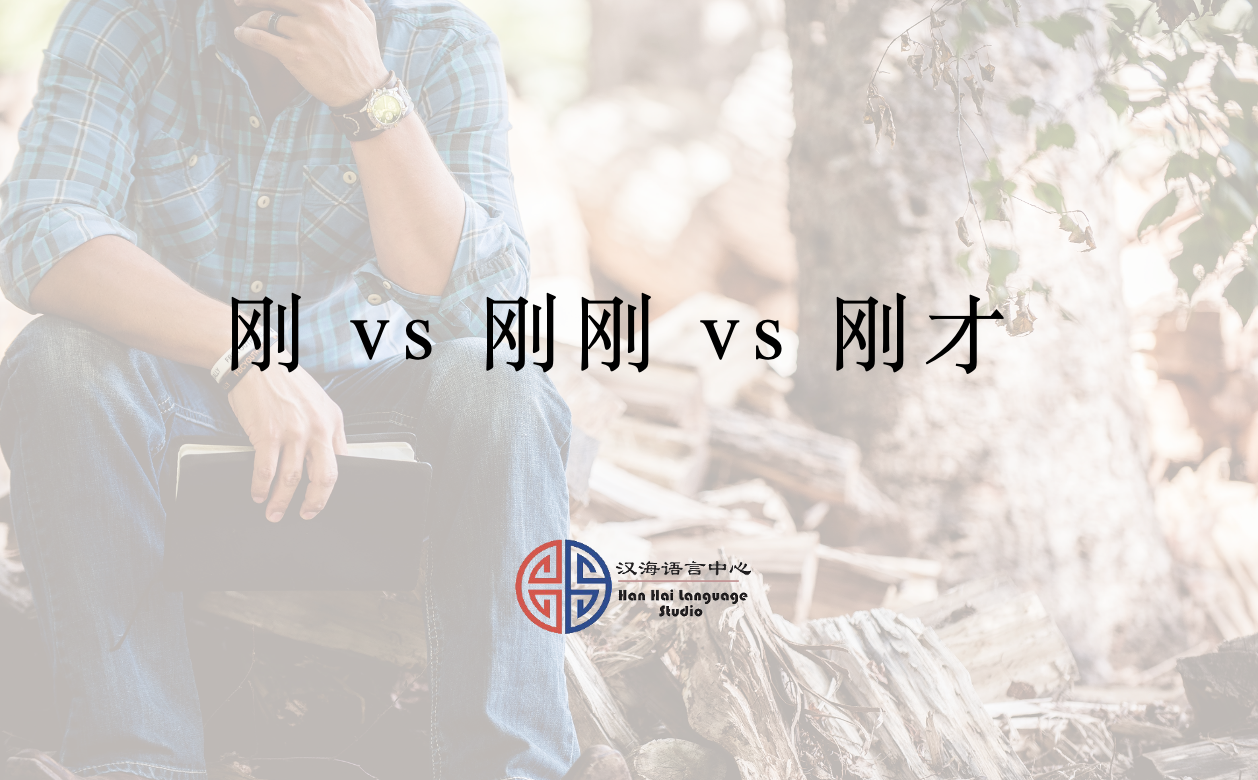Differences between “刚”, “刚刚”and “刚才”
In this article, we are going to discuss the differences and the usage of “刚(Gāng)”, “刚刚(Gāng Gāng)” and “刚才(Gāng Cái)”. These three words look similar and their functions are related to time, that is why their usage tends to confuse many Chinese learners. By the end of this article, you should gain a better understanding of these three words. There will also be a short assessment at the end to see if you have correctly grasped their concepts.
“刚”, “刚刚” and “刚才”
are used to indicate an action that has just happened a short while ago. However, their differences lie in:
1. “刚” and “刚才” belong to different parts of speech.
“刚” is an adverb that can only be used before a verb. In English, it means "just", which emphasises that an action happened not so long ago. The grammar structure for “刚” is [Subject + 刚 + Verb + (Object)]. From this structure, it implies that “刚” cannot be placed before the subject. Let's look at some examples:
小明的妈妈刚出门。Xiao Ming's mom just went out.
我刚醒。I just woke up.
你刚到,他就走了。He left just after you reached.
On the other hand, ”刚才“ is a time noun that can be used before or after the subject. In English, it means "just now", referring to a timeframe that is within half an hour ago relative to "now". The first grammar structure for “刚才” is [“刚才” + Subject + Verb] where it is placed before the subject. Let's look at some examples:
刚才我在开会。I was in a meeting just now.
刚才他来找过你。He came to find you just now.
The second grammar structure for “刚才” is [Subject + ”刚才“ + Verb] where it is placed after the subject. Let's look at some examples:
我刚才在开会。I was in a meeting just now.
他刚才来找过你。He came to find you just now.
2. “刚” and “刚才” have slightly different emphasis and meaning
“刚” means something that has happened not so long ago and stresses the timing of an event. It emphasises the speaker's feeling of time as time elapsed. Since the feeling could be subjective, the timeframe "刚" refers to could be a minute ago, a day ago, or even a month ago, as long as it feels "just" to the speaker. Besides, “刚” can indicate a past event, present event, or even future event. Let's look at some examples:
Past: 我刚下飞机。I just alighted the plane.
Present: 我刚出门。I just went out.
Future: 如果你要学中文,刚开始的时候一定要学好汉语拼音。If you are going to learn Chinese, you need to master Hanyu Pinyin when you just started.
On the other hand, “刚才” means something that happened very close to the present time. The time elapsed is relatively shorter than “刚”. As a time noun, "刚才“ emphasizes the content of what happened just now. It is just like the other time nouns such as "今天(today)" and "明天(tomorrow)".
我刚才吃了一片面包。I ate a piece of bread just now.
他刚才去学校了。He went to school just now.
3. Negation
“刚才” can be followed by a negative word while "刚" cannot. As mentioned previously, ”刚“ is an adverb that is followed by a verb, it cannot take up a negative word such as “没“ after it. For examples:
我刚才没吃早餐。I did not eat breakfast just now.
刚才他没接电话。He did not pick up the phone just now.
4. As an adverb, "刚" can have other meanings.
”刚" can also be used to indicate the minimum achievement of a certain degree. For examples:
这次考试小明刚及格。Xiao Ming just passed the exam.
声音不大,刚能听见。The sound was not loud, just audible.
"刚" can also indicate that time, space, degree, and quantity just meet the mark or standard. For examples:
不多不少,刚好一杯。No more, no less, just one cup.
人数刚好。The number of people is just right.
5. Since "刚才" refers to the past, the "了" particle often appears at the end.
As mentioned earlier, ”刚才“ is a time noun and it denotes the past. Hence, the verb often needs to have ”了“ at the end of the sentence. For example:
你刚才干什么去了?What did you do just now?
我刚才去打电话了。I went to make a call just now.
6. Meaning and Usage of "刚刚“.
As you read up till now, you may be curious about the meaning and usage of ”刚刚“. Interestingly, ”刚刚“ can be used to express both ”刚“ and ”刚才“. In case if you don't know whether to use ”刚“ or ”刚才“, you can use ”刚刚” instead.
"刚刚“ is like “刚”, it is used before a verb to indicate something that happened a short while ago. The reduplication of "刚” makes the descriptive feeling of the time elapsed stronger. Also, the time is often shorter than “刚” alone.
In sum, remembering these six bullet points will help you gain a better understanding of how to use these three words. Let's do a quick check and see if you can answer them correctly. To know if you have gotten the correct answer, clarify it with your Chinese teacher at Hanhai Language Studio!
我( )去逛街了。
他( )从北京回来。
我前几个月( )学驾车。
小明( )来找过你。
我妈妈( )在接电话。
你( )没有告诉我,所以我不知道。
他( )睡着,不要打扰他。

